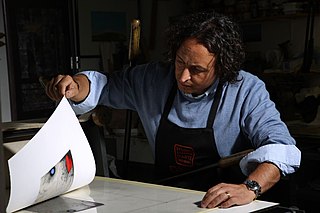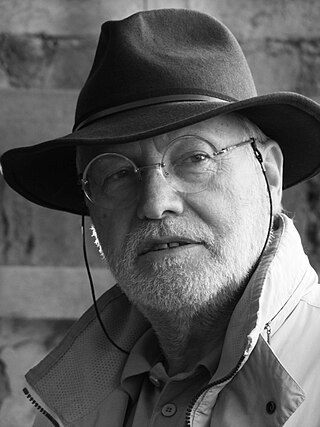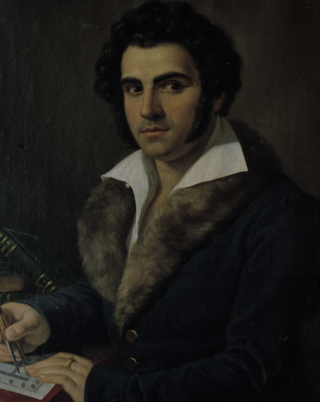Related Research Articles

The Gallerie dell'Accademia is a museum gallery of pre-19th-century art in Venice, northern Italy. It is housed in the Scuola della Carità on the south bank of the Grand Canal, within the sestiere of Dorsoduro. It was originally the gallery of the Accademia di Belle Arti di Venezia, the art academy of Venice, from which it became independent in 1879, and for which the Ponte dell'Accademia and the Accademia boat landing station for the vaporetto water bus are named. The two institutions remained in the same building until 2004, when the art school moved to the Ospedale degli Incurabili.

Prince Baldassarre Boncompagni-Ludovisi, was an Italian historian of mathematics and aristocrat.

The Accademia di Belle Arti di Venezia is a public tertiary academy of art in Venice, Italy.

The Accademia delle Arti del Disegno is an academy of artists in Florence, in Italy. It was founded on 13 January 1563 by Cosimo I de' Medici, under the influence of Giorgio Vasari. It was initially known as the Accademia e Compagnia delle Arti del Disegno. It was made up of two parts: the company was a kind of guild for all working artists, while the academy was for more eminent artistic figures of the Medici court, and supervised artistic production in the Duchy of Florence.

Tommaso Minardi was an Italian painter and author on art theory, active in Faenza, Rome, Perugia, and other towns. He painted in styles that transitioned from Neoclassicism to Romanticism.

Girolamo Michelangelo Grigoletti was an Italian painter, active in a Neoclassical style. He was also a professor at the Accademia di Belle Arti di Venezia.
Accademia often refers to:
Count Alberto Pappafava or Pappafava dei Carraresi (1832-1929) was an Italian painter, mainly of Romantic style landscapes, in watercolor and oil.
Dario Graffi was an influential Italian mathematical physicist, known for his researches on the electromagnetic field, particularly for a mathematical explanation of the Luxemburg effect, for proving an important uniqueness theorem for the solutions of a class of fluid dynamics equations including the Navier-Stokes equation, for his researches in continuum mechanics and for his contribution to oscillation theory.
Marsha Steinberg is a Florentine artist, whose works include drawings, etchings and paintings. She is Coordinator of the Studio Art Program at the California State University Program, Florence and is professor of painting at the Italian International Institute, Lorenzo de' Medici in Florence, Italy.

Sandro Bracchitta is an Italian printmaker.
Carlo Servolini was an Italian artist from Livorno, in Tuscany. He worked in oils, water-colour, etching and lithography. He was the father of the wood engraver Luigi Servolini.

The Accademia di Belle Arti di Parma is an artistic institution in the city of Parma, Italy. It is presently located in a wing of the Palazzo della Pilotta in the center of the city.

Roberto Venturoni, was an Italian painter, engraver and sculptor.
Pino Grimaldi, born Giuseppe Grimaldi, was an Italian designer and academic.
Mirko Basaldella was an Italian sculptor and painter.
Dalia Colli is an Italian make-up artist.

Niccolò "Nicola" Matas was an Italian architect and professor. He is best known for being the architect of the 19th century Gothic Revival façade of the Basilica of Santa Croce in Florence, Italy. Matas was a professor at the Academy of Fine Arts, Florence. He is one of the important architects in the history of the city of Florence.
Giuseppe "Bepi" Santomaso was an Italian painter and educator. Santomaso was an important figure in 20th-century Italian painting, and he taught art at the Accademia di Belle Arti di Venezia for 20 years.
References
- ↑ "A VENEZIA CON FRANCESCA GENNA PER ESPLORARE INSIEME IL MONDO DELL'INCISIONE SOSTENIBILE | 6 OTTOBRE". Navarraeditore.it (in Italian). Retrieved 1 March 2017.
- ↑ "Landscape, Tuscany". Art of the Print. Retrieved 14 March 2017.
- ↑ "Francesca Genna: Tree Study, Tuscany". Art of the Print. Retrieved 14 March 2017.
- ↑ "Incisione Sostenibile. Incontro con Francesca Genna - Scuola Internazionale di Grafica, Venezia". Scuolagrafica.it (in Italian). 20 June 2014. Retrieved 1 March 2017.
- 1 2 3 "Francesca Genna. Traces - Mostra - Roma - Interno 14". Arte.it (in Italian). Retrieved 1 March 2017.
- ↑ "Biblioteca de la Facultad de Bellas Artes. Universidad Complutense de Madrid". Biblioteca.ucm.es (in Spanish). Retrieved 1 March 2017.
- 1 2 Melasecca, Roberta. ""Traces" di Francesca Genna" (in Italian). presS/Tletter. Retrieved 14 March 2017.
- ↑ Genna, Francesca (2009). Incisione sostenibile. Nuovi materiali e metodi dell'area non-toxic. Navarra Editore. ISBN 978-88-95756-17-2.
- ↑ Genna, Francesca (2015). Materiali e metodi per l'incisione sostenibile. Alcune esperienze. Navarra Editore. ISBN 978-88-98865-04-8.